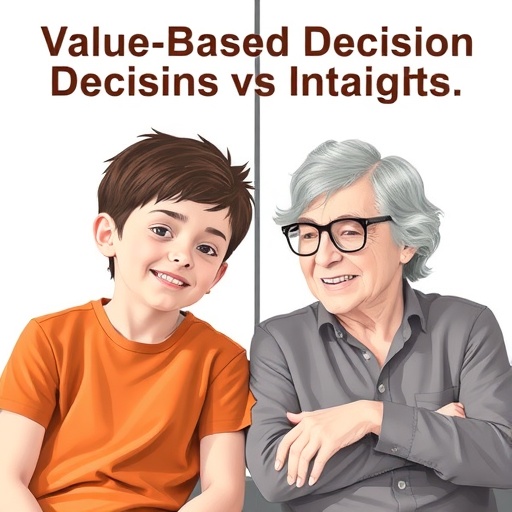In a groundbreaking study, researchers aimed to unravel the complexities of value-based decision-making, a cognitive process that governs how individuals evaluate choices based on anticipated outcomes. Their work, published in the journal J Adult Dev, shines a light on the cognitive mechanisms at play in both young and older adults, challenging preconceived notions of how age influences decision-making processes. By studying the interplay of cognition and processing noise, the researchers touched on vital aspects of psychology that govern everyday choices, raising questions that go beyond mere academic curiosity.
At its core, value-based decision-making is the process through which individuals weigh different options against expected rewards, striving to make the best possible choice. This evaluation can be influenced by numerous factors, including individual experiences and environmental stimuli, leading to variations in how decisions are made. The researchers sought to dissect this intricate process and identify how age may alter cognitive approaches to decision-making.
One of the pivotal findings of the study was the observation that young adults tend to rely on clearer cognitive evaluations when making decisions. Their brains are often equipped to process information rapidly, resulting in decisions that are grounded in clear, rational evaluations of potential outcomes. Conversely, the research suggested that older adults may employ different strategies, potentially influenced by a lifetime of experiences and the natural cognitive decline that can accompany aging.
More strikingly, the researchers uncovered an important element known as processing noise, which refers to the variability in decision-making caused by distractions or uncertainties in the environment. Young adults exhibited a lower susceptibility to processing noise, allowing them to focus on important information and make decisions more effectively. In contrast, older adults showed increased levels of processing noise, which may hinder their decision-making capabilities. This raises significant implications for understanding how cognitive faculties can shift with age, particularly in high-stakes situations requiring rapid judgment.
The methodology employed in the study was robust, focusing on a series of experimental tasks designed to simulate real-life decision-making scenarios. Participants were presented with choices that required an evaluation of potential rewards and risks. The researchers meticulously tracked the decision-making processes through real-time analysis, enabling them to assess how different age groups navigated these challenges.
Moreover, the analysis encompassed neuropsychological assessments to better understand the underlying cognitive mechanisms. By combining behavioral data with cognitive performance metrics, the researchers were able to construct a comprehensive picture of how decision-making evolves with age. This multifaceted approach provided deeper insights into the cognitive architectures that influence value-based decision-making across the lifespan.
Interestingly, the researchers also found that the presence of processing noise led to an increase in reliance on heuristics for decision-making among older adults. Heuristics are mental shortcuts that simplify complex decision problems but can also result in biased outcomes. This tendency to default to heuristics in the face of uncertainty can be a double-edged sword; while it may facilitate quicker decisions, it can also compromise the quality of those decisions.
As the researchers delved deeper, they highlighted the socio-emotional aspects of decision-making, particularly in older adults. The study suggested that as we age, emotional intelligence and social experience may alter our decision-making strategies. Older adults could prioritize emotional satisfaction or relationship-building over purely rational evaluations, illustrating a shift in the underlying values that guide their decisions.
These findings have profound implications not only for our understanding of aging and cognition but also for designing interventions aimed at improving decision-making skills in older adults. Tailored approaches that address the specific challenges posed by processing noise could help enhance decision-making outcomes for senior populations, contributing positively to their quality of life.
While the study primarily focused on individual cognitive processes, the broader societal implications cannot be overlooked. As the global population ages, understanding how decision-making abilities change is vital for various sectors, including healthcare, economics, and public policy. This research serves as a call to action for policymakers and practitioners to consider cognitive variations with age while designing services and support systems that cater to older adults.
In conclusion, the research led by Richtmann and colleagues marks an important addition to the existing literature on cognition and aging. Their in-depth examination of value-based decision-making and its relationship to processing noise highlights the dynamic interactions between age, cognition, and the choices we make daily. Future studies can build on these findings, further elucidating the complexities of human decision-making as we age. Understanding these mechanisms not only enriches academic discourse but also has the potential to improve the lives of countless individuals navigating their own decision-making processes.
The imperative now lies in cultivating awareness of these cognitive shifts, translating scientific insights into practical applications that empower individuals of all ages to engage effectively in the decision-making processes that shape their lives. As our understanding of age-related cognitive changes continues to grow, the hope is that we can foster environments conducive to wise and fulfilling decision-making, ensuring that the wisdom of age can lead to informed and enriching choices.
Subject of Research: Value-Based Decision-Making and Its Relation to Cognition and Processing Noise in Young and Older Adults.
Article Title: Value-Based Decision-Making and Its Relation to Cognition and Processing Noise in Young and Older Adults.
Article References:
Richtmann, A., Petzold, J., Glöckner, F. et al. Value-Based Decision-Making and Its Relation to Cognition and Processing Noise in Young and Older Adults.
J Adult Dev (2024). https://doi.org/10.1007/s10804-024-09504-8
Image Credits: AI Generated
DOI: 10.1007/s10804-024-09504-8
Keywords: Value-Based Decision-Making, Aging, Cognition, Processing Noise, Neuropsychology.




